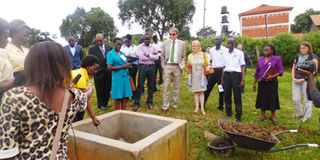Gayaza girls’ fight for the environment

The delegation including Gayaza Headmistress Victoria Kisalare ( in blue) European Union head of delegation Kristian Schmidt (c) and French ambassador Sophie Makame tour the biogas project site. Courtesy photo
A set of four girls at Gayaza High School, took a delegation including French Ambassador Sophie Makame, European Union head of delegation Kristian Schmidt and the media around their biogas project. Starting with the greenhouse where the school grows vegetables, they guided a tour around the school as they explained how the biogas plant which serves the main kitchen works. This was during a forum on Youth and Climate Change held at Gayaza last Saturday to coincide with the signing ceremony of the Paris Agreement on Climate Change in New York. There, world leaders dedicated to reduce greenhouse gas emissions to keep global temperatures at 2 per cent or successfully 1.5 per cent.
Playing their part
Gayaza has been at the fore front of the rallying for climate change awareness. In 2015, Gayaza High students participated in a climate change exchange dialogue with students from Lugano High school, Switzerland sharing knowledge on current and predicted impacts of climate change.
Annually, the school organises a Schools’ Farm Camp with the support of EU funded global climate change alliance project to train students in climate smart agriculture and sensitise them on climate change issues. “We first heard of climate change as students, but decided to put into practice what we had learnt. We grow our own trees and participate in school project against climate change. If we don’t prepare, the next generation will suffer. I have discussed continuing similar projects at home with my parents,” said Mary Kiwumulo, S.6.
“We even had the chance to skype with other students in Switzerland to discuss the ice melting into the ocean and rising sea levels due to global warming,” added Jovita Namugugosa in S.6. “I really applaud Gayaza High School for walking the talk by installing this biogas facility and through this of course saving the use of fuelwood. You are learning that you need more cows, more manure and that you need the bio gas facility close to the kitchen,” said Schmidt. Makame observed, “It requires radically changing our way of life and consumption pattern of energy sources because nature never deceives us, it is we who decieve ourselves.”
The forum which also celebrated Youth day had a number of activities around climate change issues such as talks, a quiz, music and dance performances. Gayaza’s Ruth Abasa who led a group of vocalists performed a gender equality song with melodious relish from Sheila Aturinda, Angel Kitone, Melisa Ahereza.
A skit by Makerere University’s French Club “L’Environement Degrade- Environmental Degredation”, tackled the ripple effects of environmental change. Felix Bwikizo, a Journalism and Communication student at Makerere University dropped a Hip hop jam about global warming. St Nelly Sade, and MC Aggie of Urban Accent, guitarist Joshua, Jora MC, Yoda, Abrams Tekya, Lady Slyk from NTV’s “Follow The Beat” are among the artists that performed. Their songs all carried rich messages meant to give youth inspiration to action.
Gayaza’s Project
The students are currently running a biogas project. Kibirige Brian, the farm manager in charge of projects explains the project, “Biogas starts with raising of cattle because you need the cow dung as a raw material for feeding in the bio gas. Students have learnt to do this dirty work and know that from dirty work you get money.” The classes contribute in the following ways, Form 1 grow vegetables, Form 2 do Cattle farming, Form 3: Poultry and piggery farming, while Form 4, 5 & 6: plant bananas.




